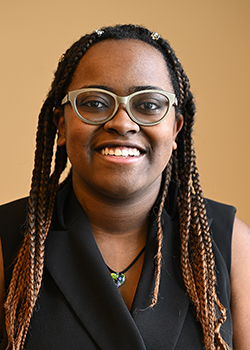
Lauren C. Anatol
Student-Designed Interdisciplinary major from Brooklyn, New York
Alongside friends, family and members of Connecticut College’s academic community, 18 seniors gathered in Blaustein Humanities Center on April 3 to join an esteemed group of Camels—the Langer Scholars—in a tradition that dates back nearly a century to 1928.
The designation of Langer Scholar (formerly Winthrop Scholar) is the highest academic honor bestowed by the College. Reserved for students who demonstrate exceptional scholarship, the honor is named for the late Susanne K. Langer, a distinguished philosopher and professor emeritus of Connecticut College.
Langer Scholars are also the first members of their class selected for membership in Phi Beta Kappa, the national honor society of undergraduate higher education.
After giving a brief history of the Langer Scholar designation and of Langer’s work as one of the first nationally recognized female philosophers in the United States, Assistant Professor of English and Phi Beta Kappa Delta of Connecticut Chapter Officer Rae Gaubinger congratulated the scholars on their “superior academic achievements.”
“Today we celebrate your hard work, your passion, your curiosity, your diligence and all your successes,” Gaubinger said. “We are so excited to watch you go out into the world and continue to pursue wider, clearer, more negotiable, more articulate meanings.”
Assistant Professor of English Hubert Cook gave the keynote address, Canterbury. Not “Chaucer’s Canterbury,” he clarified, but Canterbury, Connecticut, the town about 30 miles north of the Connecticut College campus where abolitionist and educator Prudence Crandall opened the first school for Black girls in the United States in 1833.
“The town was not happy. They threatened Crandall, they terrorized the girls, and in the end, they burned the school down,” Cook said. “I’ve often wondered what kept Crandall and the girls going in the midst of the constant attacks, opposition, violence. Why did they continue?”
To explore that question, Cook took the audience through an analysis of Elizabeth Alexander’s poem, Allegiance.
“I love thinking about what ‘allegiance’ means in the poem,” Cook said. “The allegiance isn’t necessarily to a group. In this view, it isn’t Crandall’s allegiance to black girls that this poem foregrounds; rather, it’s the students’ allegiance to inquiry itself.”
In conclusion, Cook told the scholars that when he thinks of Canterbury, “I think of Crandall, I think of the school, I think of the girls. I think of you and I think of our shared work, our allegiance, regardless of discipline—and often enlisting more than one—our allegiance to following the line of an idea as meticulously and as beautifully as we can manage. I think of how we are always reaching, reaching for that radiance.
“I hope that this appetite, this craving, remains steadfast for you, even as the world appears austere. Indeed, I hope that you carry Canterbury, Connecticut, with you and that it offers you light.”

Student-Designed Interdisciplinary major from Brooklyn, New York

Physics major from New York, New York

Human Development and Psychology double major from Melrose, Massachusetts

ACS-Certified Chemistry and Dance double major from Wells, Maine

Neuroscience major from Chicago, Illinois

Classics and Dance double major from Aurora, Colorado

Anthropology and Environmental Studies double major from Yonkers, New York

Film Studies major from West Newbury, Massachusetts

Sociology major from Newton, Massachusetts

Art and Psychology double major from Monmouth Junction, New Jersey

Psychology major from Glastonbury, Connecticut

Biochemistry, Cellular and Molecular Biology major from Hanoi, Vietnam

Computer Science and Statistics and Data Science double major from Hanoi, Vietnam

Quantitative Economics and Econometrics major from Medway, Massachusetts

Classics and Government double major from Saratoga Springs, New York

English and Sociology double major from New Rochelle, New York

Film Studies major from Erie, Colorado

English and Human Development double major from Portsmouth, Rhode Island